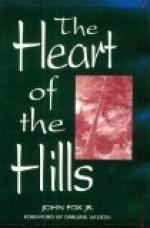for college in the Blue-grass. On the way he had
stayed all night in a little mountain town in the foot-hills.
He had got up at dawn, but already, to escape the
hot rays of an August sun, mountaineers were coming
in on horseback from miles and miles around to hear
the opening blast of the trumpet that was to herald
forth their wrongs. Under the trees and along
the fences they picketed their horses, thousands of
them, and they played simple games patiently, or patiently
sat in the shade of pine and cedar waiting, while
now and then a band made havoc with the lazy summer
air. And there, that morning, Jason had learned
from a red-headed orator that “a vicious body
of deformed Democrats and degenerate Americans”
had passed a law at the capital that would rob the
mountaineers of the rights that had been bought with
the blood of their forefathers in 1776, 1812, 1849,
and 1865. Every ear caught the emphasis on “rob”
and “rights,” the patient eye of the throng
grew instantly alert and keen and began to burn with
a sinister fire, while the ear of it heard further
how, through that law, their ancient Democratic enemies
would throw
their votes out of the ballot-box
or count them as they pleased—even for
themselves. If there were three Democrats
in a mountain county— and the speaker had
heard that in one county there was only one—
that county could under that law run every State and
national election to suit itself. Would the men
of the mountains stand that?—No!
He
knew them—that orator did.
He
knew that if the spirit of liberty, that at Jamestown
and Plymouth Rock started blazing its way over a continent,
lived unchanged anywhere, it dwelt, however unenlightened
and unenlightening, in a heart that for an enemy was
black with hate, red with revenge, though for the
stranger, white and kind; that in an eagle’s
isolation had kept strung hard and fast to God, country,
home; that ticking clock-like for a century without
hurry or pause was beginning to quicken at last to
the march-rhythm of the world—the heart
of the Southern hills. Now the prophecy from
the flaming tongue of that red-headed orator was coming
to pass, and the heart of the Kentucky hills was making
answer.
It was just before noon when the boy reached the hill
overlooking the capital. He saw the gleam of
the river that came down from the mountains, and the
home-thrill of it warmed him from head to foot.
Past the cemetery he went, with a glimpse of the statue
of Daniel Boone rising above the lesser dead.
A little farther down was the castle-like arsenal
guarded by soldiers, and he looked at them curiously,
for they were the first his had ever seen. Below
him was the gray, gloomy bulk of the penitentiary,
which was the State building that he used to hear
most of in the mountains. About the railway station
he saw men slouching whom he knew to belong to his
people, but no guns were now in sight, for the mountaineers
had checked them at the adjutant-general’s office,




